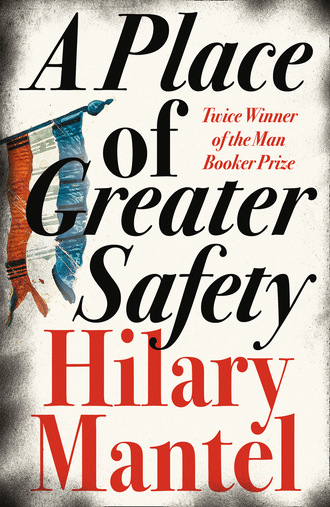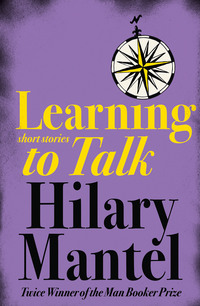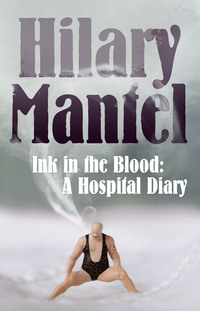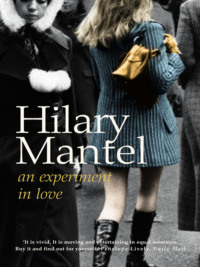
Полная версия
A Place of Greater Safety
Good Lord, she thought. She remembered her journals, with a sense of shame. And I thought I practised prose …
All this time, she was trying to avoid thinking about the content of the letter. She did not really believe it could apply to her, though logic told her that such a thing would not be misdirected.
No, it was she – her soul, her face, her body – that occasioned the prose. You could not examine your soul to see what the fuss was about; even the body and face were not easy. The mirrors in the apartment were all too high; her father, she supposed, had directed where to hang them. She could only see her head, which gave a curious disjointed effect. She had to stand on tiptoe to see some of her neck. She had been a pretty little girl, yes, she knew that. She and Adèle had both been pretty little girls, the kind that fathers dote on. Last year there had been this change.
She knew that for many women beauty was a matter of effort, a great exercise of patience and ingenuity. It required cunning and dedication, a curious honesty and absence of vanity. So, if not precisely a virtue, it might be called a merit.
But she could not claim this merit.
Sometimes she was irritated by the new dispensation – just as some people are irritated by their own laziness, or by the fact that they bite their nails. She would like to work at her looks – but there it is, they don’t require it. She felt herself drifting away from other people, into the realms of being judged by what she cannot help. A friend of her mother said (she was eavesdropping, as it happened): ‘Girls who look like that at her age are nothing by the time they’re twenty-five.’ The truth is, she can’t imagine twenty-five. She is sixteen now; beauty is as final as a birthmark.
Because her skin had a delicate pallor, like that of a woman in an ivory tower, Annette had persuaded her to powder her dark hair, and knot it up with ribbons and flowers to show the flawless bones of her face. It was as well her dark eyes could not be taken out and put back china blue. Or Annette would have done it, perhaps; she wanted to see her own doll’s face looking back. More than once, Lucile had imagined herself a china doll, left over from her mother’s childhood, wrapped up in silk on a high shelf: a doll too fragile and too valuable to be given to the rough, wild children of today.
Life for the most part was dull. She could remember a time when her greatest joy had been a picnic, an excursion to the country, a boat on the river on a hot afternoon. A day with no studies, when the regular hours were broken, and it was possible to forget which day of the week it was. She had looked forward to these days with an excitement very like dread, rising early to scan the sky and predict the weather. There were a few hours when you felt ‘Life is really like this’; you supposed this was happiness, and it was. You thought about it at the time, self-consciously. Then you came back, tired, in the evening, and things went on as before. You said, ‘Last week, when I went to the country, I was happy.’
Now she had outgrown Sunday treats; the river looked always the same, and if it rained, and you stayed indoors, that was no great disaster. After her childhood (after she said to herself, ‘my childhood is over’) events in her imagination became more interesting than anything that happened in the Duplessis household. When her imagination failed her, she wandered the rooms, listless and miserable, destructive thoughts going around in her head. She was glad when it was time for bed and reluctant to get up in the mornings. Life was like that. She would put aside her diaries, consumed with horror at her shapeless days, at the waste of time that stretched before her.
Or pick up her pen: Anne Lucile Philippa, Anne Lucile. How distressed I am to find myself writing like this, how distressed that a girl of your education and refinement can find nothing better to do, no music practice, no embroidery, no healthy afternoon walk, just these death-wishes, these fantasies of the morbid and the grandiose, these blood-wishes, these images, sweet Jesus, ropes, blades and her mother’s lover with his half-dead-already air and his sensual, bruised-looking mouth. Anne Lucile. Anne Lucile Duplessis. Change the name and not the letter, change for worse and worse for it’s much less dull than better. She looked herself in the eye; she smiled; she threw back her head, displaying to her advantage the long white throat that her mother deems will break her admirers’ hearts.
Yesterday Adèle had begun on that extraordinary conversation. Then she had walked into the drawing room and seen her mother slide her tongue between her lover’s teeth, knot her fingers into his hair, flush and tremble and decline into his thin and elegant hands. She remembered those hands, his forefinger touching paper, touching her handwriting: saying Lucile, my sweet, this should be in the ablative case, and I am afraid that Julius Caesar never imagined such things as your translation suggests.
Today, her mother’s lover offered her marriage. When something – blessed event, however strange – comes to shake us out of our monotony – then, she cried, things should happen in ones.
CLAUDE: ‘Of course I have said my last word on the matter. I hope he has the sense to accept it. I don’t know what can have led him to make the proposal in the first place. Do you, Annette? Once it might have been a different story. When I met him at first I took to him, I admit. Very intelligent … but what is intelligence, when someone has a bad moral character? Is basically unsound? He has the most extraordinary reputation … no, no, no. Can’t hear of it.’
‘No, I suppose you can’t,’ Annette said.
‘Frankly, that he has the nerve – I’m surprised.’
‘So am I.’
He had considered sending Lucile away to stay with relations. But then people might put the worst construction on it – might believe she had done something she shouldn’t have.
‘What if …?’
‘If?’ Annette said impatiently.
‘If I were to introduce her to one or two eligible young men?’
‘Sixteen is too young to marry. And her vanity is already great enough. Still, Claude, you must do as you feel. You are the head of the household. You are the girl’s father.’
ANNETTE sent for her daughter, having fortified herself with a large glass of brandy.
‘The letter.’ She clicked her fingers for it.
‘I don’t carry it on my person.’
‘Where then?’
‘Inside Persian Letters.’
An ill-advised merriment seized Annette. ‘Perhaps you would like to file it inside my copy of Les Liaisons Dangereuses.’
‘Didn’t know you had one. Can I read it?’
‘No indeed. I may follow the advice in the foreword, and give you a copy on your wedding night. When, in the course of time, your father and I find you someone to marry.’
Lucile made no comment. How well she hides, she thought – with the help of only a little brandy – a most mortifying blow to her pride. She would almost like to congratulate her.
‘He came to see your father,’ Annette said. ‘He said he had written to you. You won’t see him again. If there are any more letters, bring them straight to me.’
‘Does he accept the situation?’
‘That hardly matters.’
‘Did it not seem proper to my father that I be consulted?’
‘Why should you be consulted? You are a child.’
‘I might have to have a chat with my father. About certain things I saw.’
Annette smiled wanly. ‘Ruthless, aren’t you, my dear?’
‘It seems a fair exchange.’ Lucile’s throat was constricted. On the precipice of these new dealings, she was almost too frightened to speak. ‘You give me time to think. That’s all I’m asking for.’
‘And in return you promise me your infant discretion? What is it, Lucile, that you think you know?’
‘Well, after all, I’ve never seen my father kiss you like that. I’ve never seen anybody kiss anybody like that. It must have done something to brighten your week.’
‘It seems to have brightened yours.’ Annette rose from her chair. She trailed across the room, to where some hothouse flowers stood in a bowl. She swept them out, and began to replace them one by one. ‘You should have gone to a convent,’ she said. ‘It’s not too late to finish your education.’
‘You would have to let me out eventually.’
‘Oh yes, but while you were busy with your plain chant you wouldn’t be spying on people and practising the art of manipulation.’ She laughed – without merriment now. ‘I suppose you thought, until you came into the drawing room, how worldly-wise and sophisticated I was? That I never put a foot wrong?’
‘Oh no. Until then, I thought what a boring life you had.’
‘I’d like to ask you to forget what has happened in the last few days.’ Annette paused, a rose in her hand. ‘But you won’t, will you, because you’re stubborn and vain, and bent on seizing what you – quite wrongly – feel to be your advantage.’
‘I didn’t spy on you, you know.’ She wanted, very badly, to put this right. ‘Adèle dared me to walk in. What would happen if I said yes, I want to marry him?’
‘That’s unthinkable,’ her mother said. One flower, icy-white, escaped to the carpet.
‘Not really. The human brain’s a wonderful thing.’
Lucile retrieved the long-stemmed rose, handed it back to her mother. She sucked from her finger a bead of blood. I may do it, she thought, or I may not. In any event, there will be more letters. She will not use Montesquieu again, but will file them inside Mably’s disquisition of 1768: Doubts on the Natural Order of Societies. Those, she feels, have suddenly become considerable.
III. Maximilien: Life and Times
(1787)
MERCURE DE FRANCE, June 1783: ‘M. de Robespierre, a young barrister of great merit, deployed in this matter – which is in the cause of the arts and the sciences – an eloquence and wisdom that give the highest indications of his talents.’
‘I see the thorn that’s in the rose
In these bouquets you offer me …’
Maximilien de Robespierre, Poems
THE CUTTING was growing yellow now, worn from much handling. He had been trying to think how to preserve it and keep it clean, but the whole sheet was curling at the edges. He was certain that he knew it by heart, but if he simply repeated it to himself, it might have been something he had made up. But when you read it, held the paper in your hand, you could be sure that it was another person’s opinion, written by a Paris journalist, set up by the printers. You could not say that it had not happened.
There was quite a long report of the case. It was, of course, a matter of public interest. It had all begun when a M. de Vissery of Saint-Omer got himself a lightning conductor and put it up on his house, watched by a dour crowd of simpletons; when the work was finished they had clumped off to the Municipality and claimed that the thing actually attracted lightning, and must be taken down. Why would M. de Vissery want to attract lightning? Well, he was in league with the devil, wasn’t he?
So, to law over the subject’s right to have a lightning conductor. The aggrieved householder consulted Maître de Buissart, a leading figure at the Arras Bar, a man with a strong scientific bent. Maximilien was well in with de Buissart, at the time. His colleague got quite excited: ‘You see, there’s a principle at stake; there are people trying to block progress, to oppose the dissemination of the benefits of science – and we can’t, if we count ourselves enlightened men, stand idly by – so would you like to come in on this, write some letters for me? Do you think we should write to Benjamin Franklin?’
Suggestions, advice, scientific commentary poured in. Papers were spread all over the house. ‘This man Marat,’ de Buissart said, ‘it’s good of him to take so much trouble, but we won’t push his hypotheses too strongly. I hear he’s in bad odour with the scientists of the Academy.’ When, finally, the case went to the Council of Arras, de Buissart stood aside, let de Robespierre make the speeches. De Buissart hadn’t realized, when the case began, what a strain on his memory and organizational powers it would be. His colleague didn’t seem to feel the strain; de Buissart put it down to youth.
Afterwards, the winners gave a party. Letters of congratulation came – well, pouring in would be an exaggeration, but there was no doubt that the case had attracted attention. He still had all the papers, Dr Marat’s voluminous evidence, his own concluding speech with the last-minute emendations down the side. And for months when people came calling the Aunts would take out the newspaper and say, ‘Did you see about the lightning conductor, where it said Maximilien did so well?’
Max is quiet, calm and easy to live with; he has a neat build and wide, light eyes of a changeable blue-green. His mouth is not without humour, his complexion is pale; he takes care of his clothes and they fit him very well. His brown hair is always dressed and powdered; once he could not afford to keep up appearances, so now appearances are his only luxury.
This is a well-conducted household. He gets up at six, works on his papers till eight. At eight the barber comes. Then a light breakfast – fresh bread, a cup of milk. By ten o’clock he is usually in court. After the sitting he tries to avoid his colleagues and get home as soon as he can. His stomach still churning from the morning’s conflicts, he eats some fruit, takes a cup of coffee and a little red wine well diluted. How can they do it, tumble out of court roaring and backslapping, after a morning shouting each other down? Then back to their houses to drink and dine, to address themselves to slabs of red meat? He has never learned the trick.
After his meal he takes a walk, whether it is fine or not, because dog Brount does not care about the weather and makes trouble with his loping about if he is kept indoors. He lets Brount tow him through the streets, the woods, the fields; they come home looking not nearly so respectable as when they went out. Sister Charlotte says, ‘Don’t bring that muddy dog in here.’
Brount flops down outside the door of his room. He closes the door and works till seven or eight o’clock; longer, of course, if there is a big case next day. When finally he puts his papers away, he might chew his pen and try some verse for the next meeting of the literary society. It’s not poetry, he admits; it’s proficient, unserious stuff. Sometimes more unserious than others; consider, for example, his ‘Ode to Jam Tarts’.
He reads a good deal; then once a week there is the meeting of the Academy of Arras. Their ostensible purpose is to discuss history, literature, scientific topics, current affairs. They do all this, and also purvey gossip, arrange marriages, and start up small-town feuds.
On other evenings he writes letters. Frequently Charlotte insists on going over the household accounts. And the Aunts take offence if they are not visited once a week. They have separate houses now, so that takes up two evenings.
There had been many changes when he returned to Arras from Paris, with his new law degree and his carefully modulated hopes. In 1776, the year of the American war, Aunt Eulalie to the general amazement announced that she was getting married. There is hope for us all, said the spinsters of the parish. Aunt Henriette said Eulalie had taken leave of her senses: Robert Deshorties was a widower with several children, including a daughter, Anaïs, who was almost of marriageable age. But within six months, Aunt Henriette’s sour grapes had turned to secretive pink blushes and an amount of unbecoming fluttering and hint-dropping. The following year she married Gabriel du Rut, a noisy man, aged fifty-three. Maximilien was glad he was in Paris and could not get away.
For Aunt Henriette’s godchild, there was no marriage, no celebration. His sister Henriette had never been strong. She couldn’t get her breath, she didn’t eat; one of these impossible girls, destined to be shouted at, always with her nose in a book. One morning – this news came to him a week old, in a letter – they found her dead, her pillow soaked in blood. She had haemorrhaged, while downstairs the Aunts were playing cards with Charlotte; while they were enjoying a light supper, her heart had stopped. She was nineteen. He had loved her. He had hoped they might be friends.
Two years after the amazing marriages, Grandfather Carraut died. He left the brewery to Uncle Augustin Carraut, and a legacy to each of his surviving grandchildren – to Maximilien, to Charlotte and to Augustin.
By courtesy of the abbot, young Augustin had taken over his brother’s scholarship at Louis-le-Grand. He’d turned into a nice, unremarkable boy, reasonably conscientious but not particularly clever. Maximilien worried about him when he went to Paris – whether he would find the standard too exacting. He had always felt that someone from their background had little to recommend him unless he had brains. He assumed that Augustin was making the same discovery.
When he arrived back in Arras he had gone to lodge with Aunt Henriette and the noisy husband – who reminded him, before the week was out, that he owed them money. To be exact, it was his father François who owed the money – to Aunt Henriette, to Aunt Eulalie, to Grandfather Carraut’s estate – he dared not inquire further. The legacy from his grandfather went to pay his father’s debts. Why did they do this to him? It was tactless, it was grasping. They could have given him a year’s grace, until he had earned some money. He made no fuss, paid up; then moved out, to save embarrassment to Aunt Henriette.
If it had been the other way around, he’d not have asked for the money – not in a year, not anytime. And now they were always talking about François – your father was like this, he was like that, your father always did such-and-such at your age. For God’s sake, he thought, I am not my father. Then Augustin came back from Louis-le-Grand, suddenly and decisively grown-up. He had an incautious mouth, he wasted his time and he was an avid though inept chaser of women. The Aunts said – not without admiration – ‘He really is his father’s son.’
Now Charlotte came home from her convent school. They set up house together in the rue des Rapporteurs. Maximilien earned the money, Augustin lounged about, Charlotte did the housekeeping and thought up cutting remarks about them both.
During his vacations from Louis-le-Grand, he had never neglected his round of duty calls. A visit to the bishop, a visit to the abbot, a visit to the masters at his first school to tell them how he was getting on. It was not that he was enchanted with their company; it was that he knew how later he would need their good will. So when he returned home, his carefulness paid off. The family had one opinion, but the town had another. He was called to the Bar of the Council of Arras, and he was made as welcome as anyone could be. Because of course he was not his father and the world had moved on; he was sober, neat and punctilious; he was a credit to the town, a credit to the abbot, and a credit to the respected relatives who had brought him up.
If only that unspeakable du Rut would quit his reminiscing … If only you could order your own mind, so that certain conversations, certain allusions, certain thoughts even, did not make you nauseated. As if you were guilty of a crime. After all, you are not a criminal, but a judge.
IN HIS FIRST YEAR he had fifteen cases, which was considered better than average. Usually his papers would be prepared a clear week in advance, but on the eve of the first hearing he would work till midnight, till dawn if necessary. He would forget everything he had done so far, lay his papers aside; he would survey the facts again; he would build the case once more, painstakingly, from its foundations. He had a mind like a miser’s strongbox; once a fact went in, it stayed there. He knew he frightened his colleagues, but what could he do? Did they imagine that he was going to be less than a very very good lawyer indeed?
He began to advise his clients to settle out of court where they could. This brought little profit to himself or his opponent, but it saved clients a lot of time and expense. ‘Other people aren’t so scrupulous,’ Augustin said.
After four months of practice he was appointed to a part-time judicial position. It was an honour, coming so soon, but immediately he wondered if it were double-edged. In his first weeks he had seen things that were wrong, and said so, naturally; and M. Liborel, who had sponsored him in his introduction to the Bar, seemed to think he had made a series of gaffes. Liborel had said (they had all said), ‘Of course, we agree on the need for a certain degree of reform, but we in Artois would prefer things not to be rushed.’ In this way, misunderstandings began. God knows, he had not set out to ruffle anyone’s feelings, but he seemed to have managed it. And so whether this judicial position was because they thought he merited it, or whether it was a sop, a bribe, a device to blunt his judgement, or whether it was a prize, a favour, or even a piece of compensation … compensation for an injury not yet inflicted?
THAT DAY CAME: that day appointed, for him to give a judgement. He sat up, the shutters open, watching the progress of the night across the sky. Someone had put down a supper tray among his papers for the case. He got up and locked the door. He left the food untouched. He expected to see it rot before his eyes; he looked, as if it were putrescent, at the thin green skin of an apple on a plate.
If you died it might be, like his mother, in a way never discussed; but he remembered her face, when she sat propped against the bolsters waiting to be butchered, and he remembered how one of the servants had said afterwards that they were going to burn the sheets. You might die like Henriette: alone, your blood pumping out on to white linen, unable to call, unable to move, shocked to death, paralysed – while downstairs, people were making small talk and passing cakes around. You might die like Grandfather Carraut – palsied and decrepit and disgusting, memory gone, fretting about the will, chattering to his under-manager about the age of the wood for the barrels; breaking off, from time to time, to chide the family for faults committed thirty years before, and to curse his pretty dead daughter for her shameful swollen womb. That was not Grandfather’s fault. That was old age. But he couldn’t imagine old age. He couldn’t imagine approaching it.
And if you were hanged? He did not want to think about it. The workaday criminal death could take half an hour.
He tried praying: some beads to keep his mind ordered. But then slipping through his fingers they reminded him of a rope, and he dropped them gently on to the floor. He kept count: ‘Pater noster, qui es in coeli, Ave Maria, Ave Maria’, and that pious addendum, ‘Gloria Patri, et Filio, et Spiritui Sancto, Amen’. The blessed syllables ran together. They made nonsense words, everted themselves, darted in and out of sense. Anyway, what is the sense? God is not going to tell him what to do. God is not going to help him. He does not believe in a God of that sort. He’s not an atheist, he tells himself: just an adult.
Dawn: he heard the clatter of wheels below the window, the leathery creak of the harness and the snort and whinny of the horse drawing a cart bringing vegetables for those who would still be alive at dinner-time. Priests were wiping their vessels for early Mass, and the household below was rising, washing, boiling water and lighting fires. At Louis-le-Grand, he would have been at his first class by now. Where were they, the children he had known? Where was Louis Suleau? Pursuing his sarcastic path. Where was Fréron? Cutting a swathe through society. And Camille would be sleeping still, this morning, gathered to the city’s dark heart: sleeping unconscious of his perhaps damned soul draped about in muscle and bone.
Brount whined at the door. Charlotte came, called him sharply to come away. Brount’s reluctant paws scrabbled down the stairs.








